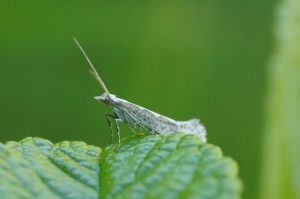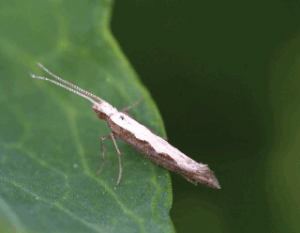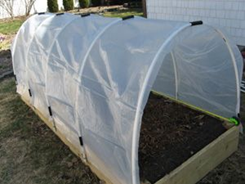 The diamondback moth (DBM) is the most destructive pest of cabbage and other vegetables worldwide, and one of the planet’s worst agricultural pests, wreaking billions of dollars’ worth of havoc for growers annually. From causing major problems for the Australian canola industry in recent years to causing a short supply of Brussels sprouts in the U.K. to becoming increasingly tough to control in the U.S., the DBM has growers globally concerned.
The diamondback moth (DBM) is the most destructive pest of cabbage and other vegetables worldwide, and one of the planet’s worst agricultural pests, wreaking billions of dollars’ worth of havoc for growers annually. From causing major problems for the Australian canola industry in recent years to causing a short supply of Brussels sprouts in the U.K. to becoming increasingly tough to control in the U.S., the DBM has growers globally concerned.
Caterpillars eat many small holes in the leaves of the host plants, often leaving the leaf outermost layer of cells intact, making a ‘feeding window’. Most damage is caused by the caterpillars tunneling into the heads of plants such as cabbage and Brussels sprouts.
The DBM’s are extremely efficient at developing resistance to all classes of insecticides, and are highly dispersive and adaptive to new environments, making epidemics of the pest unpredictable. Resistance developed towards the insecticides and the lack of natural enemies are believed to be the reasons why DBM is increasingly hard to control.
The total worldwide estimate for DBM management is $4 billion to $5 billion dollars annually, and economic losses of around $1 billion annually in the U.S.
A ‘biblical’ explosion of moths could wipe out cabbage and cauliflower crops in Britain
By Colin Fernandez for The Daily Mail | June 14, 2016
 A ‘biblical plague’ of voracious moths from continental Europe have arrived in the UK this week.
A ‘biblical plague’ of voracious moths from continental Europe have arrived in the UK this week.
Diamondback moths – which are arriving on British shores – have arrived in their tens of millions in the past few days with more expected.
The numbers of the ‘super pest’ insect – are 100 times higher than in previous years – and are expected to have a devastating effect on cabbages and other vegetables.
Once the bugs lay their eggs, the eggs take around four or five days and the moths’ larvae chew through their leaves – leaving just the veins.
The presence of diamondback moths increasing in Alberta
By Diego Flammini│Farms.com │ August 3, 2017
 The current infestations of diamondback moths across parts of Alberta aren’t what Scott Meers, insect management specialist with Alberta Agriculture and Forestry, is used to seeing.
The current infestations of diamondback moths across parts of Alberta aren’t what Scott Meers, insect management specialist with Alberta Agriculture and Forestry, is used to seeing.
“It’s an outbreak I don’t think we’ve ever seen before,” he told Call of the Land today. “At least not in my 30 years with Alberta Agriculture.”
Resistance to synthetic pyrethroid insecticides has been detected in populations of diamondback moth. The brassica growers have had difficulty in controlling the caterpillars of diamondback moth and have experienced insecticide control failures. In extreme cases, damaged crops have been plowed in and produce has been unmarketable.
Why rely on such toxic remedies to combat the diamondback moths menace?
C Tech Corporation has come up with an eco- friendly and easy to use solution.
The unique product Combirepel™ manufactured by C Tech Corporation is an anti-insect aversive which repels insects.
Combirepel™ works on the mechanism of repellence.
Combirepel™ is an extremely low concern, low toxic, low hazard, non-carcinogenic and non-mutagenic insect aversive. It does not kill or cause harm to insects as well as to the environment which indirectly helps to maintain the ecological balance.
Combirepel™ is available in the form of the masterbatch, which can be incorporated into the polymeric applications like pipes, agriculture mulch films, floating row covers, greenhouse films etc. used for crop cultivation purpose, etc.

Agriculture mulch films

Floating row covers
The product available in the form of liquid concentrate can be mixed in paints in a predetermined ratio and be applied on the fences in the fields and farms to keep the diamondback moths away from these places.
Our product in the lacquer form can be applied topically on the applications. The lacquer is compatible with most of the surfaces like wood, concrete, metal, polymer, ceramic, etc. The lacquer can be applied on the already installed pipes in the fields or garden, fences around farms and garden, thus protecting it from damage.
The product is also effective against other pests thus protecting the plants from other pest attacks.
Combirepel™ is thermally stable and does not degrade on exposure to heat and sunlight. It does not kill or harm the insect but repels them. It does not volatilize and does not degrade the soil. It is RoHS, RoHS2, ISO, REACH, APVMA, NEA, EU BPR compliant and FIFRA exempted.
Contact us at technical.marketing@ctechcorporation.com to keep the pests away.
Also, visit our websites:
http://www.ctechcorporation.com/
http://www.rodrepel.com/
http://www.termirepel.com/
http://www.combirepel.com/
Follow our Facebook pages at:
1] https://www.facebook.com/Combirepel-411710912249274/
2] https://www.facebook.com/Termirepel-104225413091251/
3] https://www.facebook.com/Rodrepel-120734974768048/
Follow us on our Twitter pages at:
1] https://twitter.com/rodrepel
2] https://twitter.com/termirepel
3] https://twitter.com/combirepel
